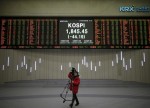prepared for the twenty-ninth meeting of the International Monetary and Financial Committee,
Washington D.C., 10 April 2014
I would like to focus on the euro area economic outlook, the ECB’s monetary policy and current policy challenges.
The recovery in the euro area is ongoing. Euro area real GDP has now increased for three consecutive quarters and recent survey data are consistent with a continuation of this trend. Looking ahead, a strengthening contribution from domestic demand should materialise, supported by our accommodative monetary policy stance, ongoing improvements in financing conditions working their way through to the real economy, and the progress made by euro area countries in terms of fiscal consolidation and structural reforms. In addition, real incomes are positively influenced by moderate commodity price developments, in particular lower energy prices. Economic activity is also expected to benefit from a gradual strengthening of demand for euro area exports. At the same time, however, unemployment in the euro area remains high, even if labour markets have shown first signs of improvement, and, overall, unutilised capacity is sizeable. Moreover, the necessary balance sheet adjustments in the public and private sectors will continue to weigh on the pace of the economic recovery. The risks surrounding the euro area economic outlook continue to be on the downside. They relate to geopolitical risks and an insufficient implementation of structural reforms in euro area countries as well as to developments in global financial markets and in emerging market economies.
Recent information remains consistent with our expectation of a prolonged period of low inflation that will be followed by a gradual upward movement in consumer prices (HICP inflation rates) during 2015 to reach levels closer to 2% towards the end of 2016. The gradual decline in euro area inflation rates since last summer primarily reflects negative contributions from energy prices as well as a substantial fall in unprocessed food price inflation. At the same time, medium to long-term inflation expectations remain firmly anchored in line with our definition of price stability. Both upside and downside risks to the outlook for price developments remain limited, and broadly balanced over the medium term. In this context, the possible repercussions of geopolitical risks and exchange rate developments will be monitored closely.
The ECB’s monetary policy stance continues to be geared towards maintaining the degree of monetary accommodation warranted by the outlook for price stability. It thereby assists the gradual recovery in economic activity. Looking ahead, the ECB is resolute in its determination to maintain a high degree of monetary accommodation and to act swiftly if required. Hence, the ECB’s Governing Council does not exclude further monetary policy easing and it firmly reiterates that it continues to expect the key ECB interest rates to remain at present or lower levels for an extended period of time. This expectation is based on an overall subdued outlook for inflation extending into the medium term, given the broad-based weakness of the economy, the high degree of unutilised capacity and subdued money and credit dynamics. The Governing Council is unanimous in its commitment to using also unconventional instruments within the ECB’s mandate in order to cope effectively with risks of a too prolonged period of low inflation. At the same time, it is closely following developments on money markets.
Since the summer of 2012, substantial progress has been made in improving the funding situation of banks in the euro area. In order to ensure an adequate transmission of monetary policy to financing conditions in all euro area countries, the fragmentation of euro area credit markets should decline further and the resilience of banks must be strengthened where needed. The comprehensive assessment by the ECB, which is now well underway, will make an important contribution in this regards. It should also foster transparency of banks’ balance sheets and strengthen confidence in the banks, thereby supporting a revival of bank credit in the euro area. As a matter of fact, banks in the euro area are continuing to strengthen their balance sheets already ahead of the execution phase of the asset quality review by the ECB and the subsequent stress test foreseen for the autumn. The ECB is also contributing towards a revitalisation of the asset-backed securities market in Europe, which would be an important avenue to further support credit flows in the euro area and for the credit transmission channel.
Important further progress on the road to banking union has been made since the previous IMFC meeting. The ECB’s internal preparations for the operational start of the Single Supervisory Mechanism (SSM) are well underway. The Supervisory Board has been fully operational since the start of this year and is among other things finalising the SSM supervisory model. On the legislative front, political agreements have been reached at the European level between the EU Council and the European Parliament on the Bank Recovery and Resolution Directive and the Deposit Guarantee Schemes Directive. More recently, agreement has also been reached on the Single Resolution Mechanism (SRM), with an effective governance and a clear road map towards constituting a Single Resolution Fund. In combination with the agreement to enhance the Fund’s borrowing capacity, this will help to break the link between national banking systems and sovereigns within the euro area and it will protect taxpayers’ money in the orderly resolution, notably, of cross-border cases. It is important now to keep up the legislative momentum, also at the national level, in order for the SSM and the SRM to become operational within approximately one year. It is worth acknowledging the very significant progress that has been made in less than two years on Europe’s ambitious commitment to build a genuine banking union.
As regards fiscal policies, euro area countries have made substantial progress with fiscal consolidation over the past few years. In the euro area, the average budget deficit has halved compared with the peak level during the crisis. This has created some room for slowing the pace of consolidation. However, we must avoid the pitfall of being complacent in order not to repeat the mistakes from pre-crisis times. Euro area countries should not unravel past consolidation achievements and should put high government debt ratios on a downward trajectory over the medium term, in line with the Stability and Growth Pact. Fiscal strategies should ensure a growth-friendly composition of consolidation to achieve better quality and more efficient public services. In this respect, we welcome the work presented in the last two editions of the IMF Fiscal Monitor on identifying well-designed and growth-friendly consolidation measures on the revenue and expenditure sides of the budget.
Lastly, although major progress has been made, euro area countries need to strengthen their efforts to reform their labour and product markets in a decisive way in order to improve competitiveness, raise potential growth and generate employment opportunities. More precisely, labour markets need to be more inclusive, flexible and resilient, while product markets, including those for services, should be made more efficient and dynamic. In addition, countries should take further steps towards improving the business environment and more growth-friendly taxation. Bold and effective implementation of these measures is crucial and primarily in the interest of the individual countries. At the same time, it is key for strengthening the functioning of the Economic and Monetary Union and will support the global recovery. Finally, it is also fully congruent with the call of the IMF Managing Director in her Global Policy Agenda for the euro area to make its contribution to reinvigorating global growth and employment.








Add a Comment
We encourage you to use comments to engage with other users, share your perspective and ask questions of authors and each other. However, in order to maintain the high level of discourse we’ve all come to value and expect, please keep the following criteria in mind:
Enrich the conversation, don’t trash it.
Stay focused and on track. Only post material that’s relevant to the topic being discussed.
Be respectful. Even negative opinions can be framed positively and diplomatically. Avoid profanity, slander or personal attacks directed at an author or another user. Racism, sexism and other forms of discrimination will not be tolerated.
Perpetrators of spam or abuse will be deleted from the site and prohibited from future registration at Investing.com’s discretion.